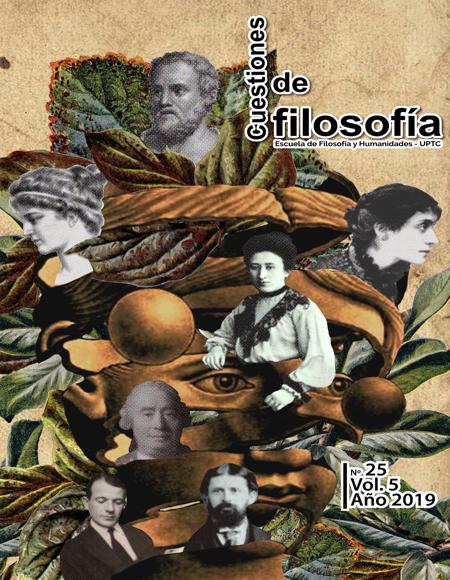Notes about philosophical teaching in the new academy
DOI:
https://doi.org/10.19053/01235095.v5.n25.2019.10679Keywords:
Nueva Academia, métodos dialécticos, Cicerón, enseñanza, autoridadAbstract
Varios hechos concurren en el desconocimiento de una posible doctrina neoacadémica: a) su fundador, Carnéades, no escribió nada; b) las transcripciones de sus discursos, por parte de discípulos directos, se perdieron; y c) la visión de los neoacadémicos como simples disputadores preocupados exclusivamente por refutar. Sin embargo, el presente trabajo aspira entrever lo que habrían sido aspectos de una posible doctrina educativa en dicha escuela, a partir de la lectura de los diálogos ciceronianos. Con este propósito, se centrará la atención, en primer término, en el testimonio del Arpinate sobre el supuesto rechazo neoacadémico a que se anteponga la autoridad a la razón, y la consecuente defensa de la libertad de juicio en el aprendiz; en segundo término, en la implementación de los métodos dialécticos a los que se recurriría para superar la autoridad en la enseñanza; y, por último, en los posibles fundamentos ontológicos de tal propuesta pedagógica. La concordancia de estos elementos hará que se concluya la posible existencia de un pensamiento educativo sistemático en la nueva Academia.
Downloads
References
Asmis, E. (2001). Basic Education in Epicureanism. L. Too (Ed.), Education in Greek and Roman Antiquity (pp. 209-239). Leiden: Brill.
Atkins, J. (2013). Cicero on Politics and the Limits of Reason. Cambridge: Cambridge University Press.
Balsdon, J. P. V. D. (1960). Auctoritas, Dignitas, Otium. The Classical Quarterly, 10(1), pp. 43-50.
Baraz, Y. (2012). A Written Republic: Cicero’s Philosophical Politics. Princeton: Princeton University Press.
Bonner, S. (2012). Education in Ancient Rome, From the Elder Cato to the younger Pliny. New York: Routledge.
Bowman, A., y Woolf, G. (Eds.). (1994). Literacy and Power in the Ancient world. Cambridge: Cambridge University Press.
Bravo, F. (1990). Introducción a la filosofía de Platón. Caracas: Eduven.
Brittain, C. (2001). Philo of Larissa: The Last of the Academic Sceptics. Oxford: Oxford University Press, 2001.
Brunt, P. A. (1988). The Fall of the Roman Republic. Oxford: Oxford University Press.
César. (1998). Guerra civil. (Trad. J. Ruiz). Madrid: Gredos.
Cicero. (1947). Orationes. (Ed. A. Clark). Oxford: Oxford University Press.
Cicero. (1959). De senectute. De amicitia. De divinatione. (Trad. W. A. Falconer). Cambridge: Harvard University Press.
Cicero. (1967). De natura deorum, Academica. (Trad. H. Rackham). London: Heinemann.
Cicerón. (1990). Cuestiones Académicas. (Trad. J. Pimentel). México: UNAM.
Cicerón. (1999a). Sobre la naturaleza de los dioses. (Trad. Á. Escobar). Madrid: Gredos.
Cicerón. (1999b). Sobre la adivinación. Sobre el destino. El Timeo. (Trad. Á. Escobar). Madrid: Gredos.
Cicerón. (2002). Sobre el orador. (Trad. J. J. Iso). Madrid: Gredos.
Culpepper, S. (2010). Catullus, Cicero, and a Society of Patrons. The Generation of the Text. Cambridge: Cambridge University Press.
Dilorenzo, R. (1978). The Critique of Socrates in Cicero’s De oratore: Ornatus and Nature of Wisdom. Philosophy and Rhetoric, 11(4), pp. 247-261.
Dugan, J. (2005). Making a New Man: Ciceronian Self-Fashioning in the Rhetorical Works. Oxford: Oxford University Press.
Fox, M. (2007). Cicero’s Philosophy of History. Oxford: Oxford University Press.
Gruen, E. (1995). The Last Generation of the Roman Republic. Berkeley: University of California Press.
Marrou, H. (1948). Histoire de l’éducation dans l’antiquité. Paris: Seuil.
Lévy, C. (1992). Cicero Academicus: Recherches sur les Académiques et sur la philosophie cicéronienne. Roma: École Française de Rome.
Morgan, T. (1998). Literate Education in the Hellenistic and Roman Worlds. Cambridge: Cambridge University Press.
Pernot, L. (1993). La Rhétorique de l’éloge dans le monde greco-romain. Paris: Collection des Études Augustiniennes.
Plutarco. (2007). Vidas paralelas VI. (Trad. Juan Guzmán). Madrid: Gredos.
Schofield, M. (1986). Cicero for and against Divination. The Journal of Roman Studies, (76), pp. 47-65.
Schofield, M. (2002). History of Hellenistic Philosophy. Cambridge: Cambridge University Press.
Schofield, M. (2008). Ciceronian dialogue. G. Simon (Ed.), The End of Dialogue in Antiquity (pp. 63-84). Cambridge: Cambridge University Press.
Too, L. (2001). Education in Greek and Roman Antiquity. Leiden: Brill.
Van der Blom, H. (2010). Cicero’s Role Models. The Political Strategy of a Newcomer. Oxford: Oxford University Press.
Wilkins, A. S. (1892). De oratore libri tres. Oxford: Clarendon Press.
Downloads
Published
How to Cite
Issue
Section
License
Reservation of Rights
The reception of an article does not imply approval or commitment regarding the date of publication; however, the author will be constantly informed about the process of selecting and editing your proposal. The text submitted to the journal will be unprecedented nature.
Regarding intellectual property rights, the author authorizes, through the signing of the letter of transfer of rights to the magazine, copy, reproduce, distribute and publish the article under the assignment by any digital medium or reprographic. Similarly, sending written questions to the journal Philosophy implies that their authors give them economic rights of the Pedagogical and Technological University of Colombia, which in turn will sell them to third party non - profit.
As to respect the intellectual property rights of third parties, the author states that respects and is committed to answer for any action claim, plagiarism or other type of claim that might arise in this regard.
Questions of philosophy, has the moral obligation to respect copyrights contained in Article 30 of Law 23 of 1982. The publisher reserves the right to make minor editing changes for a better presentation of the work.
This journal It is registered under the Creative Commons Attribution 4.0 noncommercial International. Therefore, this work may be reproduced, distributed and publicly communicated in digital format, provided that the names of the authors and the Pedagogical and Technological University of Colombia is recognized. It is allowed to quote, you adapt, transform, self-archive, republish and create from the material, for any purpose (commercial except), provided the authorship is properly recognized, a link is provided to the original work and indicate whether changes have been made .
The Pedagogical and Technological University of Colombia does not retain the rights to works published and the contents are the sole responsibility of the authors, who retain their moral rights, intellectual, privacy and publicity.
The guarantee on the intervention of the work (revision, editing, translation, layout) and its subsequent disclosure is provided through a transfer of rights, representing the magazine and the Pedagogical and Technological University of Colombia, are exempted from any liability that may arise from a bad ethical practice by the authors. As a result of the protection afforded by the transfer of rights, the magazine is not obliged to publish retractions or modify information already published, unless the errata arises editorial management process. Publishing content in this magazine does not represent royalties for taxpayers.

REVISTA CUESTIONES DE FILOSOFÍA por REVISTA CUESTIONES DE FILOSOFÍA se distribuye bajo una Licencia Creative Commons Atribución-NoComercial 4.0 Internacional.
Basada en una obra en http://revistas.uptc.edu.co/revistas/index.php/cuestiones_filosofia/user/register.
Permisos que vayan más allá de lo cubierto por esta licencia pueden encontrarse en https://mail.google.com/mail/u/0/#inbox.






 Formato Evaluación Pares Academicos
Formato Evaluación Pares Academicos




